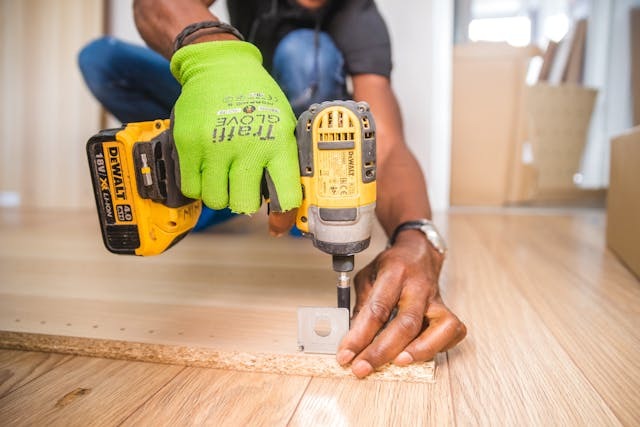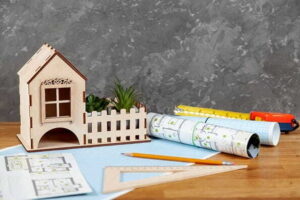Featured Image Caption: Person using Dewalt Cordless Impact Driver on Brown Board
Jump to read...
You might not think much about fasteners before you begin a do-it-yourself (DIY) project until something goes sideways. Often overlooked, it’s essential to make sure that you use high-quality fasteners.
While they may look similar, each fastener type has unique applications. When you know what screws, bolts, and anchors to use, you help make sure your project is safe, durable, and successful. Whether you’re hanging shelves, building a deck, or anchoring a heavy load into concrete, knowing how to choose the right bolt size or screw material is just as vital as the tools you use.
Types of Fasteners
Screws
Screws are some of the most common fasteners for DIY projects. They’re versatile, easy to use, and offer immense holding power. Screws are also available in a wide range of materials and thread types, such as the ones below:
- Wood screws are made for lumber. They’ve got wide threads to grip the grain without cracking it. Use them for projects like shelving, cabinetry, or any basic framing job.
- Metal screws have finer threads and sharper points. These dig into metal tightly – ideal for brackets or lightweight sheet metal work.
- Drywall screws come with bugle heads and deep threads to hold gypsum board in place without tearing through it.
- Masonry screws, often recognized as the best concrete screws, are coated for corrosion resistance and engineered to grip brick or concrete directly.
Bolts
When combined with a nut, a bolt provides secure fastening when superior durability and strength are a must. A few commonly used types of bolts include:
- Hex bolts are workhorses. They’re sturdy, six-sided, and designed for everything from deck posts to steel plates.
- Carriage bolts have rounded heads and square necks. Their appearance is best when you need one side to have a smooth finish, such as when building furniture or outdoor decks.
Anchors
Certain materials, such as drywall, plaster, and brick, are often too brittle or soft to hold a screw or bolt by themselves. Fortunately, anchors secure fasteners to provide a strong hold.
- Expansion anchors flare out inside the hole when the screw goes in. It grips the wall from within.
- Sleeve anchors are great for securing metal railings and TV brackets.
- Masonry anchors are anchors that thread themselves into surfaces. Use them with block or stone. Stainless steel hardware suppliers typically recommend using these products in harsh environments.
Choosing the Right Fasteners
Match Fasteners With Materials
It’s a simple rule but an easy one to overlook: wood screws go in wood, metal screws go in metal. You’d be surprised by how many beginners (and let’s be honest, some not-so-beginners) forget this and end up wondering why their fastener won’t bite. Even the best bolts and nuts will fail if they’re used in the wrong context.
Check Load Requirements
The next step is ensuring you know how much weight your fastener needs to hold. For instance, a lightweight shelf may only need a few plastic wall anchors. But what if you need to fasten something much heavier, such as a TV mount or outdoor fixture? These DIY jobs may require the best bolts and nuts. When in doubt, choosing stronger fasteners is better than choosing ones that are too weak.
Use the Right Tools
Ever strip a screw head and spend 20 minutes cursing while trying to get it back out?? These situations aren’t only frustrating, but they can also ruin your material and project. Thankfully, using proper drivers, drill bits, and torque settings can help ensure your fasteners and materials stay in optimal condition.
Build with Confidence
Choosing the right screws, bolts, and anchors isn’t just a minor detail – it’s an investment in the long-term success of your DIY project. Understanding which fastener works best involves knowing how to choose the right bolt size and ensuring you select a corrosion-resistant material, both of which are vital skills for any DIYer to possess.
Whether you’re fixing a few things around the house or embarking on a week-long project, a little knowledge of fasteners can go a long way. If you have a fastener-related concern, check your product packaging or seek guidance from a building professional.
By Andrew Lemieux
who is a creative writer, poet, and content strategist. He is passionate about literature, food, wine, travel, and sports. In his spare time he enjoys working on home projects and restoring the 1837 Greek Revival he and his wife own.
Member since December, 2023
View all the articles of Andrew Lemieux.




















Leave a Reply